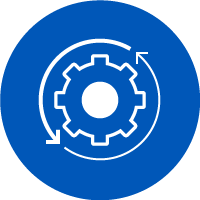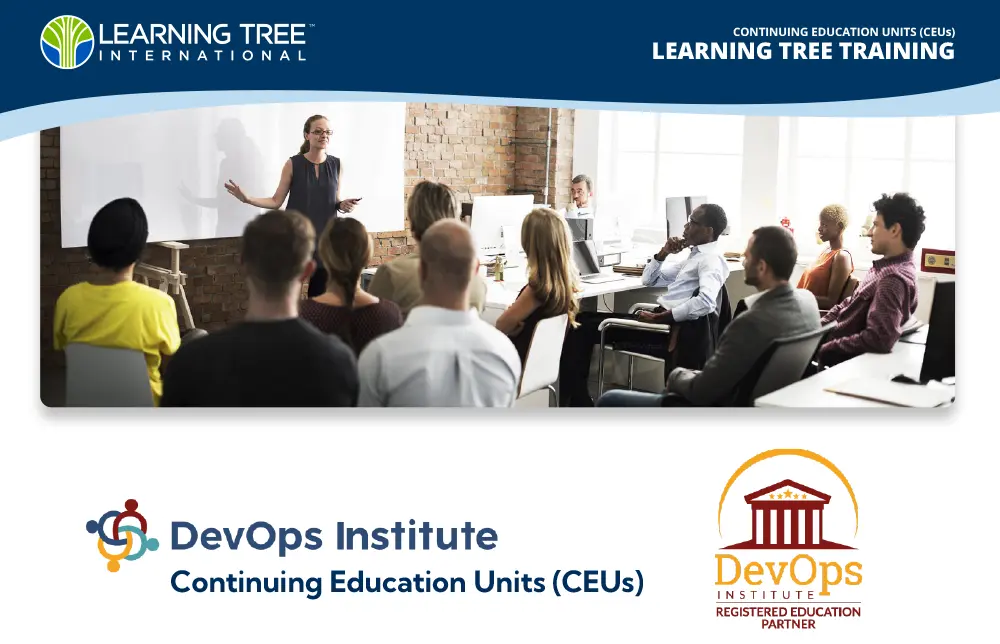-
Student Benefits
- Strong earning potential with the average salary of DevOps professionals of over $100,000 per year (Ziprecruiter.com)
- Strong career demand with over 130,000 DevOps job openings on LinkedIn
- Gain a highly sought after and transferable skill set as you learn the purpose, benefits, concepts, and vocabulary of DevOps
-
Enterprise Benefits
- 63% of DevOps organizations experience improvement in software quality (Upguard)
- Ensure the right talent and skills to deliver and maintain reliable, available, and cutting-edge software products
- Align development, operations, and business teams to improve value delivery to customers
Global Reach
More than 80 thousand qualified practitioners across 160+ countries
Proven Success
Used by 90% of Fortune 500 companies
Proven Value
25 years of adoption & adaptation by organization
Ambassadors for Change
160+ DOI ambassadors leading the DevOps global community

Learning Tree DevOps Certification Program Features
-
Access to DevOps Institute (DOI) Resources
-
DOI Community Membership
-
Certification Exam Included
DevOps Institute Certification Training Courses
DevOps Institute Certification Paths
Authorised training aligned with the DevOps Institute certifications
DevOps leaders sponsor, educate, motivate, and monitor their DevOps teams.
- DevOps Foundation® (DOFD) Certification Training • course 3685
- DevOps Leader® (DOL) Certification Training • course 3686
Recommended Elective Courses for more in-depth understanding:
- Site Reliability Engineering Foundation® (SREF) Certification Training • course 3694
- SecDevOps Foundation® (SDOF) Certification Training • course 3695
DevOps testers plan, create, execute, report, and analyze software tests.
- DevOps Foundation® (DOFD) Certification Training • course 3685
- Continuous Testing Foundation® (CTF) Certification Training • course 3689
Recommended Elective Courses for more in-depth understanding:
Agile coaches oversee, teach, and direct Agile practices.
Recommended Elective Courses for more in-depth understanding:
- Site Reliability Engineering Foundation® (SREF) Certification Training • course 3694
- SecDevOps Foundation® (SDOF) Certification Training • course 3695
DevOps security engineers collaborate to inform security practices.
- DevOps Foundation® (DOFD) Certification Training • course 3685
- SecDevOps Foundation® (SDOF) Certification Training • course 3695
- SecDevOps Practitioner — coming soon!
Recommended Elective Courses for more in-depth understanding:
Site Reliability Engineering (SRE) leaders sponsor, educate, motivate, and monitor their SRE teams.
- Site Reliability Engineering Foundation® (SREF) Certification Training • course 3694
- DevOps Foundation® (DOFD) Certification Training • course 3685
Recommended Elective Courses for more in-depth understanding:
Earn PeopleCert Continuing Education
Maintaining ITIL, Prince2, and DevOps Institute professional certifications ensures career growth, skill enhancement, and credibility by keeping you updated in a rapidly evolving business and IT landscape.
DevOps Institute Certification FAQs
The DevOps Institute creates a safe and interactive environment where DevOps professionals can:
- Network
- Gain knowledge
- Grow their careers
- Support enterprise transformation
- Celebrate professional achievements
The DevOps Institute certification pathways can help you advance and validate your DevOps expertise in critical areas like:
- SecDevOps
- Site Reliability Engineering
- Agile Service Management
- DevOps Leadership
- Continuous Testing
The certification program helps you hone your skills and technical understanding of DevOps.
After completing a DevOps certification training course with Learning Tree, you will receive an exam voucher so you can take the associated exam.
Exams are open-book and administered through the DevOps Institute.
PeopleCert CPDs are the continuing education credits that help you maintain PeopleCert certifications in PRINCE2, ITIL and DevOps Institute.
Maintaining PeopleCert Certifications
All PeopleCert Business and IT certifications (including PRINCE2, ITIL and DOI) must be renewed within three years of their original certification date. There are two ways to keep certifications current:
- Join PeopleCert Plus (a paid membership) to earn 20 CPDs per year for 3 years and renew certifications that way.
- Earn another certification from the same Product Suite (for example, to renew all ITIL certifications you can earn a new ITIL certification)
Eligible Learning Tree Training
Learning Tree training is not eligible for the PeopleCert Plus CPD program. Attendees can renew their PeopleCert certifications with Learning Tree by enrolling in another certification from the product suite they're trying to renew. Examples:
- If you hold an ITIL 4 Foundation certification, and you acquire an ITIL 4 Practitioner or ITIL 4 Specialist certification, all your certification(s) belonging to the ITIL 4 Product Suite will be renewed.
- Similarly, if you hold a PRINCE2 Practitioner certification and you acquire an MSP Foundation, all your certification(s) belonging to the PRINCE2 Project, Programme & Portfolio Management Suite will be renewed.
Learn more about eligibility and CPDs on the PeopleCert website: Keep your certifications current| (peoplecert.org)
Attendee Process for Renewing PeopleCert Certifications with Learning Tree
Once an attendee successfully earns a PeopleCert certification from the same product suite they're trying to renew, their other certifications in that product suite will automatically renew.
Approval Policies
N/A
DevSecOps and SecDevOps largely have the same goal: emphasizing the security component of any DevOps implementation. SecDevOps goes a step further by putting security at the forefront of your DevOps implementation. According to the Department of Homeland Security, the benefits of building and operating under SecDevOps framework include:
- Security is integrated into the development from the start, as opposed to being incorporated after development
- Improved ability to scale development while maintaining consistency
- Repeatable and reusable processes with security built-in from inception
- Repeatable and automated tests reduce risks and ensure compliance
As part of an exclusive partnership agreement, Learning Tree has developed the world’s first SecDevOps certification course in collaboration with the DevOps Institute, and has been fully accredited as part of their certification program. Learn more about SecDevOps here ›







